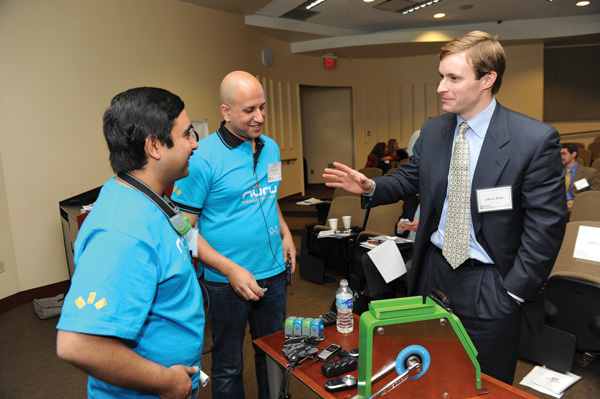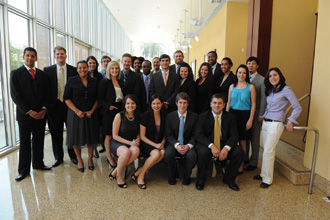Poverty and lack of access to safe, affordable lighting are two of the biggest challenges facing populations in the developing world. A startup company hopes to solve both of those problems with an innovative new product, and now, with the help of the Freeman School, it’s a little closer to achieving that goal.
Nuru Light, a company affiliated with the University of California at Berkeley that plans to distribute rechargeable lights in Africa, earned the top prize of $50,000 in the 2010 Tulane Business Plan Competition. The competition, an annual presentation of the Tulane Entrepreneurs Association, took place at the Freeman School on April 16 with the winners announced later that evening at the Tulane Council of Entrepreneurs Awards Gala at the Westin Canal Place Hotel.

Nuru Light's Sunil Bhardwaj and Sameer Hajee, left, talk about their plan to distribute rechargeable LED lights in Africa with competition judge Jeffrey Keller.
“The prize is going to go toward the $500,000 we’re looking to raise to deliver a container of our products and get them distributed,” said Sameer Hajee, executive director of Nuru Light. “We’re scaling up at the moment at a rate of 15,000 units every quarter and we want to increase that, so the money is going to help us go beyond 15,000 units.”
While the competition has in recent years featured two categories, one for traditional businesses and another for social entrepreneurship ventures, this year’s competition did away with that distinction in favor of a new focus on the principles of conscious capitalism. Each of the plans submitted had to demonstrate not just market potential but the ability to positively affect all stakeholders and the society in which the business operates.
Ninety percent of East Africans currently live without electricity and rely on light from expensive, dangerous kerosene lamps to perform basic household tasks. Nuru Light plans to manufacture and distribute sturdy, affordable LED lights that can be recharged via a unique pedal generator. Rather than selling the lights directly to end users, the company plans to work with microfinance institutions in Africa to identify entrepreneurs who can generate income for themselves by selling the lights and then charging users a small fee for recharging services.

The Tulane Entrepreneurs Association, above, received a record 93 applications to this year's business plan competition, the first to focus on the principles of conscious capitalism.
“That’s what makes it sustainable,” said Hajee, “because you’re actually generating a revenue stream for people rather than just giving them a product.”
The competition’s judges were impressed by both the company’s social mission and its smart business model.
“Light, which we totally take for granted, can change a kid’s life or a family’s life, and it can be profitable,” said investor Gary Solomon, one of this year’s judges. “Nuru Light has the potential to be a very profitable company. As I was sitting in there, I was thinking about throwing $100,000 in.”
“They have a huge certain available market and they’ve underestimated what I’ll call complementary secondary markets,” added Crichton W. Brown, managing director of Advantage Capital and another of this year’s judges. “We loved the microfinance distribution strategy, and the social and health aspects of helping the population were overwhelming to us.”
In addition to Nuru Light, this year’s finalists included Winduction, a manufacturer of small wind turbines, and Cortical Concepts, developers of an orthopedic implant to address problems associated with osteoporosis in spinal surgery.
According to Nicolas Martinez of Cortical Concepts, the competition’s emphasis on conscious capitalism is a welcome development on the business plan competition circuit.
“A lot of the other competitions have a tendency to focus on return on investment and financial models,” Martinez said. “It’s been very encouraging for us to participate in a competition that really focuses on social entrepreneurship, conscious capitalism and the value proposition of your technology.”
